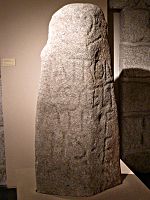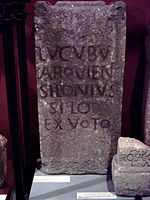"Scattered groups"? Have you read the books? Have you researched the evidence?
Yes, I have read books, a lot. And all of them show that Celtic is very questionable in Iberia.
Iberia, particularly the western parts, have some of the highest numbers of Celtic place names in Europe.
Two points :
1 - in contrary of what you say, the Celtic place-names are not numerous in Iberia, and even less in Portugal and Northern Spain. The most of the place names are related to the pre-indo-european culture. I wanted to post a source of a French searcher about this region but it is forbidden. Next time, maybe.
Nothing to do with British Isles, Gaul or Southern Germany where the toponymy is almost exclusively celtic (before ulterior waves, of course)
2 - I will take the example of the Germanics : they have founded hundreds, maybe thousands (I did not count) of place names in France, especially Northern half (Normandy, Parisian basin, Picardy, Burgundy...). But those regions have never spoken a Germanic language, excepted some fringes. So, the toponymy is not really a proof of a culture, but rather of a presence of a culture, excepted if this toponymy is strong enough to conclude to be the dominant culture. But it is obviously not the case for Iberia.
The remains of Celtic hilltop towns are found throughout Northern Portugal and Galicia, together Gallaecia.
I suppose that you are talking about the "culture of castros". They are not related to the Celts, but to pre-indo-european culture (due to the size of the sites, the material found...).
Try also the University of Wisconsin series on Celticity in Iberia and research produced by people like Cunliffe and Renfrew, among others.
Renfrew is a very controversial author. Saying that indo-european languages could have spread from Middle-east to western areas is almost not accepted by anyone in the scientific community. If you draw a map of the languages in Europe around the pre-roman times, you will notice that indo-european languages are very spread in the north and the east (Celts, Germanics, Slavics...), but the more you go to the south and the west, the more you find "strange" cultures not related to indo-europeans (Iberians, Aquitanians, Etruscan...). So, it could be strange tha the indo-european could have come from the south and west, where we find the least "indo-europeanized" areas.The renfrew theory can't work.
Celticity in Iberia is hardly something you can dismiss.
I don't dismiss the Celtic presence in Iberia, like the Germanic presence in Iberia in early middle-age. I just say that it is abusive to say that the antic culture of Iberia was celtic, like it would be wrong to say that France was Germanic in early middle-age because of toponymes, runes or archaeologic material. And if we take the archaeology, we have very few things about Celts in Iberia. The english wiki article have made original researches when it says that we have huge Celtic settlements in Iberia. In fact, this article is few sourced (essentially University of Michigan), and this source is not so affirmative that it appears in the article.
In fact, I think that the Celtic conscience was born in Galicia for political reasons. It was a mean to convince people to be attached to the autonomy toward the power of Madrid. But it is another debate...











